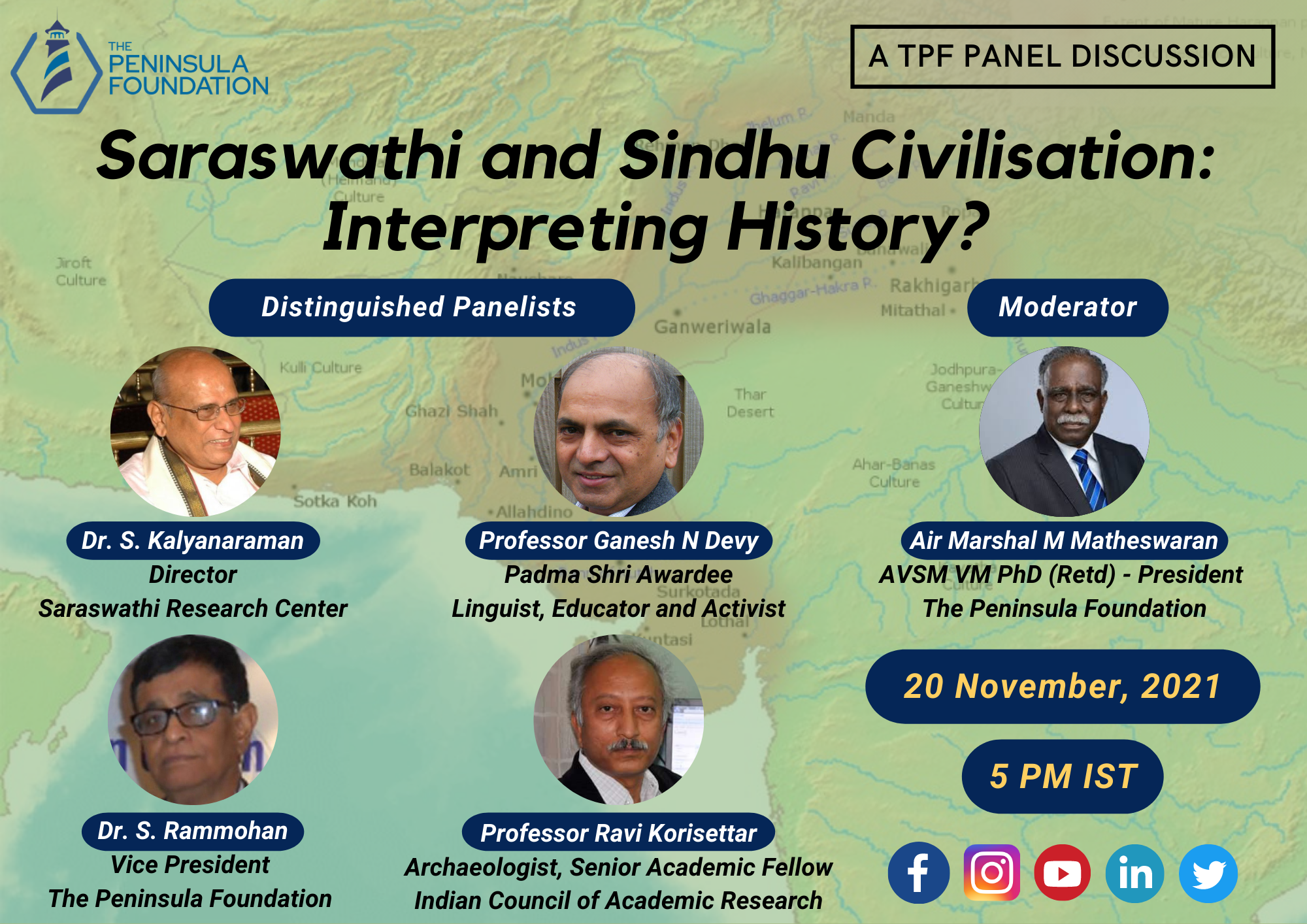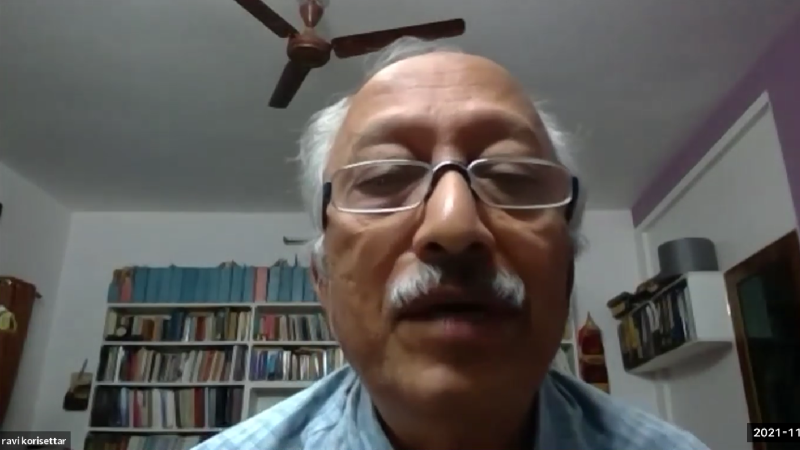
Saraswathi and Sindhu Civilisation: Interpreting History?
A TPF Panel Discussion on the topic “Saraswathi and Sindhu Civilisation: Interpreting History?”.
Event Brief:
The Peninsula Foundation (TPF) convened an online webinar on the mythical river Saraswathi and Sindhu Civilisation on November 20. Four distinguished speakers Dr. S. Kalyanaraman, Director of Saraswathi Research Center, Prof. Ganesh N Devy, Padma Shri Awardee, Linguist and Educator, Dr. S. Rammohan, Vice President, The Peninsula Foundation and Prof. Ravi Korisettar, Senior Academic Fellow, Indian Council of Academic Research joined in the debate to share their ideas and perspectives on the river and riverine civilisation. Air Marshal M Matheswaran, the Chairman and President of TPF moderated the event Saraswathi and Sindhu Civilisation: Interpreting History.

Dr. S. Kalyanaraman began the discussion on the river Saraswathi and civilisation. “About two thousand sites have been found on the banks of the river Saraswathi. We currently have around 8000 inscriptions of the Indus Script. Saraswathi is not a mythical/spiritual waterway but a real river that existed in ancient times and gave rise to the vedic civilisation. Humongous trade activities were carried during the Bronze Age in this maritime waterway. The region was called Meluha,” asserted Dr. S. Kalyanaraman.
In the webinar, Dr. Kalyanaraman stated that the stupa in the Mohenjo-Daro landscape has a resemblance with Pushkarni (temple) and further stated that they need to be studied in greater detail. He spoke about “the Ahicchatra” which is an important site in the copperware culture. The copper and Tin traders carried out trade with Mesopotamia armourers (Akkadians). The trade practices traced the relevance of maritime merchants to the Saraswathi civilisation. The evidence of sewn boats of Kerala is relevant in this regard.
Dr. Kalyanaraman has identified some of the sculptures related to the priests who were mentioned in the Vedas. Several proven studies have shown that most of the tin-bronze artefacts of Mesopotamia contained copper from Khetri mines located in the present-day Rajasthan.
“Satellite images are used to trace the ancient route of the River Saraswathi. The work is ongoing to reorient the River Saraswathi,” he stated.
Dr. S. Kalyanaraman is the Director of the Sarasvati Research Centre and is the Chair of the Taksha Indic Sarasvati-Sindhu Civilisation (TISSC) Center: Traditions, Research & Studies. He also serves the Rameshwaram Ramasethu Protection Movement as its National President.
 Professor Ravi Korisettar, the second speaker raised the issue of the material as well as cultural evidence of the Saraswathi Civilisation. A Senior Academic Fellow at the Indian Council of Academic Research, Professor Ravi Korisettar is a key contributor to Indian Palaeolithic archaeology, specializing in geo-archaeological methods and approaches to understanding the relationship between prehistoric humans and their environments.
Professor Ravi Korisettar, the second speaker raised the issue of the material as well as cultural evidence of the Saraswathi Civilisation. A Senior Academic Fellow at the Indian Council of Academic Research, Professor Ravi Korisettar is a key contributor to Indian Palaeolithic archaeology, specializing in geo-archaeological methods and approaches to understanding the relationship between prehistoric humans and their environments.
“The region was geographically controlled by resources, and there are signs of the trade practices. The transformation of this ancient region has taken place from time to time. There is a time gap of about 4000 years or so and there were some remnants that there was a stimulus from the western side of Asia. There was greater density in the Harappan region towards the Indian side.
There are immense doubts about the existence of the River Saraswathi during the Indus valley civilisation. The changes in tectonics plates and strata of freshwater question the lack of an evidence-based approach concerning River Saraswathi. The post Harappans spread not only eastward but also spread northwestward. This shows the large spread of the Indus Civilisation, but it does not have any link to the Vedic culture that emerged later in the Gangetic plains ” Professor Ravi Korisettar said.
On the question of connections between the Indus valley civilisation and Peninsular India, Professor Ravi Korisettar remarked, the material cultural evidence does not reflect clear widespread connections of the Indus valley civilisation to Peninsular India.
“As long as we don’t build up adequate material evidence, we should not venture into such interpretations,” Professor Korisettar asserted.
He further stated that, sometimes, material and cultural similarities are not clear evidence of continuity “There are spatial differences between the Indus provinces and Peninsular India. The idea that the Indus civilisation influenced Peninsular India is not archaeologically valid. Further, there is no contemporary evidence of the expansion of the valley civilisation southward and such a claim has no tangible evidence.”
 The third speaker Prof. Ganesh N Devy’s perspectives differed from what Dr. S. Kalyanaraman presented. Padma Shri Devy appreciated Dr. Kalyanaraman for his tremendous energy in gathering evidence from all kinds of disciplines.
The third speaker Prof. Ganesh N Devy’s perspectives differed from what Dr. S. Kalyanaraman presented. Padma Shri Devy appreciated Dr. Kalyanaraman for his tremendous energy in gathering evidence from all kinds of disciplines.
Stressing a quote – “Archaeology is silent history and History is articulate,” Ganesh N Devy briefly remarked on linguistics, the semantic capacity of a language and linguistic civilisations.
“Languages belong to families. Languages are born. Languages grow along the river in civilisations. But the growth normally moves from the origin of the river in the direction of water flow,” Prof. Ganesh N Devy said.
Dr. S. Rammohan, who is at the helm of Heritage and Culture areas of research for TPF, gave his views. He briefly remarked on religion and civilisation and ancient Tamil literature.
Distinguished Panelists:
Event Brochure – Saraswathi and Sindhu Civilisation: Interpreting History?
Hourly Schedule
Program Schedule
- 5:00 PM - 5:05 PM
- Welcome Address and Introductory Remarks
- Air Marshal M Matheswaran AVSM VM PhD (Retd), President - The Peninsula Foundation
- 5:05 PM - 5:40 PM
- Presentation and Lecture
- r. S. Kalyanaraman, Director, Saraswathi Research Center
- 5:40 PM - 6:35 PM
- Panel Discussion followed by Q&A
- Moderated by Air Marshal M Matheswaran, AVSM VM PhD (Retd) - President, The Peninsula Foundation
- 6:35 PM - 6:42 PM
- Concluding Remarks
- Concluding Remarks by Air Marshal M Matheswaran AVSM VM PhD (Retd)
- 6:42 PM - 6:45 PM
- Vote of Thanks
